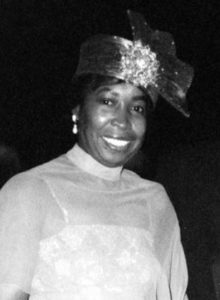In honor of Black History Month, AGA is showcasing the African American changemakers of gastroenterology and hepatology. Before we highlight our peers making a change today, we’d like to introduce you to two African American pioneers in the field of gastroenterology, Drs. Leonidas Berry and Sayde B. Curry, who paved the way for present and future Black gastroenterologists.

Dr. Leonidas Barry
The first Black gastroenterologist
Dr. Leonidas Berry (1902-1995) was born in Woodsdale, North Carolina and attended Wilberforce University in 1924. Following his graduation, Dr. Berry moved to Chicago and received his second bachelor’s degree from the University of Chicago and medical degree from Rush Medical College in 1929. In 1933, he received an M.S. degree in pathology from the University of Illinois Medical School.
Dr. Berry is the first Black gastroenterologist and is most internationally known for his invention of the Eder-Berry biopsy gastroscope in 1936, the first direct-vision suction instrument used to take biopsies, which changed the field of endoscopy forever.
Dr. Berry called himself a “multi-dimensional doctor” including intersections of physician, inventor, church leader, civil rights activist and even historian. His scientific and professional achievements, as well as his lifelong fight against racial discrimination in medicine, are vividly documented in the Leonidas H. Berry Papers at the National Library of Medicine which includes more than 1,600 items.
In the early 1950s, Dr. Berry became president of Cook County Hospital’s Physician Association where he implemented the “Berry Plan,” a citywide movement that provided medical counseling clinics for the prevention and follow-up care of young drug users; the program was later implemented by the Illinois State Department of Health.
During the 1965 voting rights march in Selma, Alabama, Dr. Berry headed a delegation from the National Medical Association (NMA) and worked in a first-aid tent treating injured marchers. From 1965 to 1966, he served as president of the NMA, an organization developed for Black physicians as they were not permitted to join the American Medical Association (AMA) due to their race. In this role, he pushed the AMA to end its approval of all-white chapters which was banished by the year 1970.
Dr. Berry spoke at several conferences around the world and published almost 100 articles in numerous medical journals.

Sadye Beatryce Curry
The first Black woman gastroenterologist
Dr. Sadye Beatryce Curry (1941-) was born in Reidsville, North Carolina and graduated from Johnson C. Smith University in 1963. She completed medical school at Howard University College of Medicine in 1967. Dr. Curry completed her internship in internal medicine at Duke University in 1967 and became the first African American woman to complete postgraduate medical training at the university at a time when the field was dominated by men.
Dr. Curry completed her fellowship training in gastroenterology at Duke in 1972 and became the first African American woman gastroenterologist in the U.S. She was recruited back to Howard University to join the faculty in 1972, later serving as chief of medicine at Howard University Hospital.
At Howard University Hospital, Dr. Curry began a career characterized by fighting barriers and educating students and patients with a passion that resulted in her being a role model for many. During her career, she was a founding member and served as president of the Leonidas Berry Society for Digestive Diseases, a society for people of color with careers in gastroenterology, basic science and surgery. Dr. Curry was also the first woman to serve as chair of the National Medical Association’s internal medicine and gastroenterology sections.
Dr. Curry retired from Howard University in 2000 and is still supporting Black physicians and scientists in her retirement.
To learn more about Dr. Curry, view this interview with one of our long-standing AGA members, Dr. Joanna Wilson.












